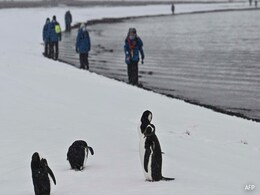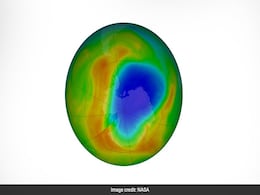Antarctic Ozone Hole
- All
- News
-

Antarctic Ozone Hole Might Fully Recover by 2066, Claims New Study
- Tuesday November 5, 2024
- Written by Gadgets 360 Staff
In 2024, scientists observed a notable reduction in the size of the Antarctic ozone hole, marking it as the seventh-smallest on record. With ongoing efforts to eliminate chlorofluorocarbons (CFCs), experts are optimistic that the ozone layer could fully recover by 2066. Factors contributing to this positive trend include a decrease in harmful chemi...
-
 www.gadgets360.com
www.gadgets360.com
-

Antarctic Wildlife Is Being Sunburnt. Scientists Say It's A "Wake-Up Call"
- Thursday May 2, 2024
- World News | Edited by Amit Chaturvedi
The ultraviolet radiation from the Sun increase the risk of skin cancer and cataracts in humans, but researchers do not yet know if the same is true for Antarctic mammals and birds.
-
 www.ndtv.com
www.ndtv.com
-

Ozone Hole 7 Times Bigger Than Last One Discovered: What You Need To Know
- Wednesday July 6, 2022
- Science | Edited by Amit Chaturvedi
The ozone hole was found by a scientists in University of Waterloo, Canada. The discovery has led to fresh concerns among environmentalists.
-
 www.ndtv.com
www.ndtv.com
-

Scientists Discover Year-Round Ozone Hole Over Tropics, May Lead to Increased Ground-Level UV Radiation
- Wednesday July 6, 2022
- ANI
Scientists have discovered an ozone hole in the earth’s lower stratosphere that is comparable in depth — but seven times larger — to the springtime Antarctic ozone hole. The large, all-season ozone hole has been detected over the tropics, which make up half of the Earth's surface area and are home to about half the planet’s population. The ...
-
 www.gadgets360.com
www.gadgets360.com
-

Ozone Hole Above Antarctica Is Smallest On Record, But There's A Catch
- Tuesday October 22, 2019
- Science | Andrew Freedman, The Washington Post
The Antarctic ozone hole hit its smallest annual peak on record since tracking began in 1982, the National Oceanic and Atmospheric Administration and NASA announced Monday. Although we're making progress in cutting down on the use of ozone-depleting chemicals, the milestone doesn't mean we've solved the problem, the agencies cautioned.
-
 www.ndtv.com
www.ndtv.com
-

IIT Kharagpur Study Confirms Healing Of Antarctic Ozone Hole
- Friday November 30, 2018
- Education | Indo-Asian News Service
A study conducted by a group of scientists at IIT Kharagpur has come up with new data that they claim confirm "healing' of Antarctic Ozone hole.
-
 www.ndtv.com/education
www.ndtv.com/education
-

Ozone Hole Over The Antarctic Has Shrunk, Now It's The 'Size Of India'
- Friday July 1, 2016
- World News | Agence France-Presse
The hole in the ozone layer over the Antarctic has begun to shrink, signalling good news for the environment decades after an international accord to phase out certain pollutants, researchers said Thursday.
-
 www.ndtv.com
www.ndtv.com
-

Ozone Hole Gets Bigger, Earth to Bear More Ultraviolet Damage
- Friday October 30, 2015
- World News | Indo-Asian News Service
The 2015 Antarctic ozone hole area was larger and formed later than in recent years, scientists from NASA and the National Oceanic and Atmospheric Administration (NOAA) have said.
-
 www.ndtv.com
www.ndtv.com
-

Antarctic Ozone Hole Might Fully Recover by 2066, Claims New Study
- Tuesday November 5, 2024
- Written by Gadgets 360 Staff
In 2024, scientists observed a notable reduction in the size of the Antarctic ozone hole, marking it as the seventh-smallest on record. With ongoing efforts to eliminate chlorofluorocarbons (CFCs), experts are optimistic that the ozone layer could fully recover by 2066. Factors contributing to this positive trend include a decrease in harmful chemi...
-
 www.gadgets360.com
www.gadgets360.com
-

Antarctic Wildlife Is Being Sunburnt. Scientists Say It's A "Wake-Up Call"
- Thursday May 2, 2024
- World News | Edited by Amit Chaturvedi
The ultraviolet radiation from the Sun increase the risk of skin cancer and cataracts in humans, but researchers do not yet know if the same is true for Antarctic mammals and birds.
-
 www.ndtv.com
www.ndtv.com
-

Ozone Hole 7 Times Bigger Than Last One Discovered: What You Need To Know
- Wednesday July 6, 2022
- Science | Edited by Amit Chaturvedi
The ozone hole was found by a scientists in University of Waterloo, Canada. The discovery has led to fresh concerns among environmentalists.
-
 www.ndtv.com
www.ndtv.com
-

Scientists Discover Year-Round Ozone Hole Over Tropics, May Lead to Increased Ground-Level UV Radiation
- Wednesday July 6, 2022
- ANI
Scientists have discovered an ozone hole in the earth’s lower stratosphere that is comparable in depth — but seven times larger — to the springtime Antarctic ozone hole. The large, all-season ozone hole has been detected over the tropics, which make up half of the Earth's surface area and are home to about half the planet’s population. The ...
-
 www.gadgets360.com
www.gadgets360.com
-

Ozone Hole Above Antarctica Is Smallest On Record, But There's A Catch
- Tuesday October 22, 2019
- Science | Andrew Freedman, The Washington Post
The Antarctic ozone hole hit its smallest annual peak on record since tracking began in 1982, the National Oceanic and Atmospheric Administration and NASA announced Monday. Although we're making progress in cutting down on the use of ozone-depleting chemicals, the milestone doesn't mean we've solved the problem, the agencies cautioned.
-
 www.ndtv.com
www.ndtv.com
-

IIT Kharagpur Study Confirms Healing Of Antarctic Ozone Hole
- Friday November 30, 2018
- Education | Indo-Asian News Service
A study conducted by a group of scientists at IIT Kharagpur has come up with new data that they claim confirm "healing' of Antarctic Ozone hole.
-
 www.ndtv.com/education
www.ndtv.com/education
-

Ozone Hole Over The Antarctic Has Shrunk, Now It's The 'Size Of India'
- Friday July 1, 2016
- World News | Agence France-Presse
The hole in the ozone layer over the Antarctic has begun to shrink, signalling good news for the environment decades after an international accord to phase out certain pollutants, researchers said Thursday.
-
 www.ndtv.com
www.ndtv.com
-

Ozone Hole Gets Bigger, Earth to Bear More Ultraviolet Damage
- Friday October 30, 2015
- World News | Indo-Asian News Service
The 2015 Antarctic ozone hole area was larger and formed later than in recent years, scientists from NASA and the National Oceanic and Atmospheric Administration (NOAA) have said.
-
 www.ndtv.com
www.ndtv.com









